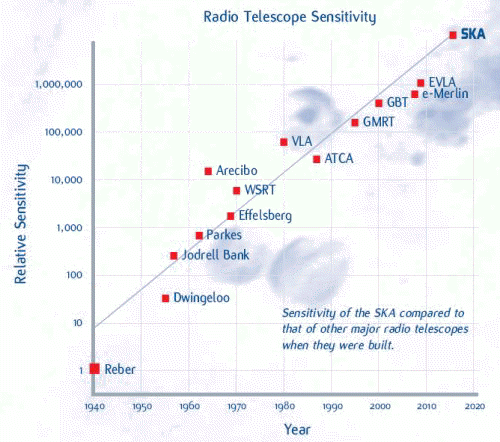|
|
|
|
|
|
|
News & Views item - January 2010 |
![]() African Physicists Gather in Dakar: The SKA a Topic for Discussion.
(January 15, 2010)
African Physicists Gather in Dakar: The SKA a Topic for Discussion.
(January 15, 2010)
 According
to ScienceInsider while the conference, January 11-16, 2010 is
"focused" on lasers and optics, hallway discussion was dominated by radio
astronomy and in particular whether or not Africa might be able to prevail over
Australia/New Zealand in hosting the world's largest scientific instrument, the
Square Kilometre Array (SKA) radio telescope.
According
to ScienceInsider while the conference, January 11-16, 2010 is
"focused" on lasers and optics, hallway discussion was dominated by radio
astronomy and in particular whether or not Africa might be able to prevail over
Australia/New Zealand in hosting the world's largest scientific instrument, the
Square Kilometre Array (SKA) radio telescope.
The bid, headed by the Republic of South Africa is in fact a multinational coalition of scientists who believe they now have "a punter's chance that a few years ago would've been a major long shot".
John Bohannon writing in ScienceInsider notes that Charles McGruder, an astronomer from Western Kentucky University in Bowling Green, laid out a battle plan for winning the bid for Africa. Professor McGruder is a past president of the U.S. National Society of Black Physicists and a National Science Foundation–funded promoter of African astronomy.
Phil Charles, director of the Southern African Large Telescope believes that because the United States will defray one third of SKA's US$2.3 billion construction bill, Professor McGruder's influence could be "pivotal", and Professor McGruder told Mr Bohannon: "We have a real kinship; bringing the SKA to Africa is our top priority." Nevertheless, Dr Charles agrees the actual process for selection by the SKA steering committee is not transparent. It is made up of representatives of the 19 SKA member states, and its decision is due in 2012.
Professor McGruder says it is imperative for African scientists to show a united front and to this end Ahmadou Wagué, a physicist at the University of Dakar in launching the African Physical Society said: "It is crucial to have this society so that we scientists can put pressure our our governments to make pan-African science possible. Mobility is a huge problem. This has been the first time that many of us scientists have met each other face to face."
Just one of the problems is that obtaining travel visas within Africa has hampered previous meetings.
And the reality of the bid is that Africa's chances to win the SKA will require "unprecedented regional scientific cooperation, because its massive array of dishes would be spread across nine different countries, with the core in South Africa". In Ndumiso Cingo's, view, a physicist and manager of South Africa's National Laser Centre, "The biggest problem is putting the legal framework in place in each state to make this international network function".
On the other hand Sune Svanberg, a physicist at Lund University in Sweden attending the conference feels: "This meeting makes it clear that Africa has achieved the critical mass of scientists; the SKA belongs here."